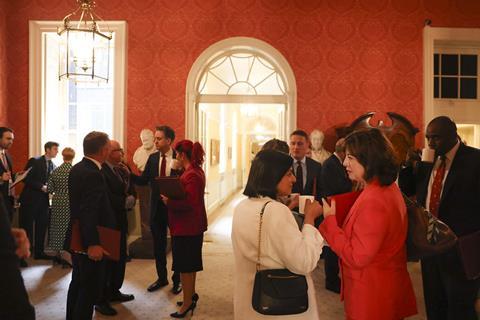Who will be making the important decisions in government affecting the construction industry? Daniel Gayne finds out

For the first time in 14 years, Labour bottoms are filling the seats around the Cabinet table. These past few days after Keir Starmer’s historic general election victory last week have seen his team for government emerge.
In the run-up to the election, Building spoke to the built environment’s top public affairs professionals to field their predictions and expectations. Some have since been realised, but there have also been plenty of surprises – new faces that the built environment will have to work to woo.
Among the very first appointments announced last week were Rachel Reeves as chancellor of the Exchequer, Angela Rayner as deputy prime minister and Pat McFadden as chancellor of the Duchy of Lancaster. Their prominence, particularly that of McFadden, in the order of appointments chimes with expectations that they, along with Starmer, will take key strategic decisions as a “quad”.
McFadden, a former MP and minister for business, innovation and skills, may be less known to construction than the other quad members, but he played a major role in the election as Labour’s national campaign coordinator and now looks set to become a major influence on government policy. There had been reports that Starmer was lining up crossbench peer Baroness Louise Casey for a senior role to work alongside McFadden on coordinating government delivery of his key manifesto missions, but this has yet to materialise.
Other influential figures around the central team include Morgan McSweeney, the election campaign manager who was reportedly pivotal in the party rowing back on its £28bn green pledge, and former senior civil servant Sue Gray, who led Labour’s preparations for government.
Gray is reportedly looking to introduce cross-departmental mission boards to drive progress towards achieving the government’s goals, and people involved in public affairs in the built environment say they can already see elements of this un-siloed approach.
Labour’s five missions to rebuild Britain
Kickstart economic growth to secure the highest sustained growth in the G7 – with good jobs and productivity growth in every part of the country making everyone, not just a few, better off.
Make Britain a clean energy superpower to cut bills, create jobs and deliver security with cheaper, zero-carbon electricity by 2030, accelerating to net zero.
Take back our streets by halving serious violent crime and raising confidence in the police and criminal justice system to its highest levels.
Break down barriers to opportunity by reforming our childcare and education systems, to make sure there is no class ceiling on the ambitions of young people in Britain.
Build an NHS fit for the future that is there when people need it; with fewer lives lost to the biggest killers; in a fairer Britain, where everyone lives well for longer.
One of the major stories of the Starmer government so far has been the new prime minister’s use of the House of Lords and non-political appointments. Lord Hendy, chair of Network Rail, has been appointed as rail minister within Louise Haigh’s transport department, while businessman James Timpson will be given a peerage to take up a role as prisons minister.
It is as yet unclear what impact Timpson’s views on punishment – the founder of the shoe-repairing, key-cutting, dry-cleaning firm has previously suggested that only a third of prisoners should really be in prison – might have on the UK’s prison building programme.
There have also been (as yet unconfirmed) rumours that former Conservative minister Nick Boles might be given a major advisory role as planning tsar, while Chris Stark, former chief executive of the climate change committee, has been picked to head up a new “mission control”, overseeing the transition to clean power.
The Department for Energy Security and Net Zero (DESNEZ) has said the new mission control will be a “one-stop shop”, bringing together a top team of industry experts and officials to troubleshoot and clear the way for energy projects.
According to Patrick Traynor, associate director at Copper Consultancy, a specialist communications consultancy in the infrastructure sector, Labour’s clean energy ambition could be among the most consequential for the built environment more broadly. “[Planning reform] is crucial to what Labour are trying to achieve, especially their 2030 clean power targets,” he told Building ahead of the election. “To achieve that reform of the planning system is absolutely critical.”
Traynor said he was anticipating that an energy independence bill would be among the first pieces of legislation the party brings forward after an election win, which would include some of its most significant changes to planning policy. “It’s hard to say because they could tweak existing pieces of legislation or use secondary legislation,” he said. “But I think that the energy independence act will contain a lot of interesting things from a planning point of view.”
While planning is theoretically the domain of Matthew Pennycook, the minister for housing, Traynor said that Ed Miliband’s team in DESNEZ “cannot really achieve what they want to without reform”, adding that the former shadow Treasury had also been heavily involved in this workstream.

The Treasury’s heavy interest in planning reform appears to have since been confirmed by the topic’s dominance in Rachel Reeves’ first major speech after her appointment as chancellor, in which she reversed the ban on onshore wind projects and promised to bring back mandatory housing targets.
Darren Jones, who has been appointed chief secretary to the Treasury, is “kind of the link between Treasury and the planning team”, according to Traynor. Jones is not yet a household name but, as an increasingly frequent media performer for the party, he soon will be.
It is notable that he has been asked to attend Cabinet meetings as part of his role.
Jones has also won admirers across the built environment through his involvement in the former shadow Treasury team’s direct engagement with the industry. A senior figure at one major contractor singled him out as an impressive figure.
Robert Lee, senior external affairs manager at the Construction Products Association, also identified him for praise. “Darren is talent, frankly, and I think that is why he does the morning media round so often,” he said. “He knows his brief and he is on top of the detail.
“When I talk to professionals in other spheres, they all identify Darren […] as someone to look out for. It will be interesting to see what happens after the election and how long he will stay in his brief before he gets promoted.”
I think they really do need to beef up the level of expertise and experience that they have got in that [DESNEZ] team
Louise Hutchins, head of public affairs, UK Green Building Council
Charlotte Wills, a director at Portland Communications specialising in the built environment, described Jones as “essentially Rachel Reeves’ No 2” and said he had been relied upon to make key decisions. He was a key player in the costing of Labour’s manifesto.
“He is passionate about the future of infrastructure and what it looks like – both housing and digital,” she said.
Jones had been scheduled to deliver a keynote speech on the final day of this year’s UKREIIF conference in Leeds in May, but his appearance was cancelled after the election was called. Had he given it, the speech would have set out the results of Labour’s review into infrastructure delivery, overseen by Jones, which recommended combining the National Infrastructure Commission and Infrastructure and Projects Authority to create a National Infrastructure and Service Transformation Authority with increased powers and an updated mandate.
According to Traynor, those on the energy side of infrastructure also have a good relationship with Ed Miliband, who is well known in the sector and has a “really good understanding of his brief”. Over the past few years, the Department for Levelling Up, Housing and Communities (DLUHC) has been perhaps the most influential part of government as far as the built environment has been concerned and, while its significance would no doubt continue under Labour, the party’s focus on retrofit and green energy means increasing attention will likely turn to DESNEZ.

There is a question around who the energy minister will be, with former shadow minister Alan Whitehead standing down at the election. Whithead “has been their policy guru forever”, according to Louise Hutchins, head of public affairs at the UK Green Building Council, and Traynor notes that the former MP for the Southampton Test constituency (which no longer exists following the boundary changes) has been “really good in the role”.
Hutchins said her team at UKGBC were “worried about that role being just distributed across that team and there not being a proper focus and somebody taking a lead on the built environment”.
She and several others speculated before the election that Whitehead could be made a peer and brought in as a government adviser. So far, this has not been the case, and the question around who will be energy minister remains open.
More generally, Hutchins said, the former shadow DESNEZ team really needed to “beef up the level of expertise and experience they have got”, and, perhaps paradoxically, suggests the new intake of MPs could be a good source to draw on. Of the three prospective parliamentary candidates – Miatta Fanhbulleh, Polly Billington and Ryan Jude – whom Hutchins said might make useful junior ministers, only the first two won their seats.
The first of them, Miatta Fanhbulleh, is among a wave of the new intake given junior positions in government. According to Hutchins, the former chief executive of the New Economics Foundation had been advising Ed Miliband and, as predicted, she has now been given a role in DESNZ as a parliamentary under-secretary of state.
Sarah Jones has been appointed as a minister of state in DESNEZ and the Department for Business and Trade (DBT), presumably continuing her shadow brief for industry and decarbonisation. Hutchins suggested that her job might be focused on the industrial strategy elements of the retrofit challenge. According to Wills she is “well respected and known for being effective”.
As well as fulfilling her role as deputy prime minister, Angela Rayner is already having an impact as housing secretary, knocking two letters off her department’s name. Levelling up has been consigned to the dustbin of history, with the department reverting to its previous title – the Ministry of Housing, Communities and Local Government. Rayner’s compound role could mean that junior ministers play a more prominent role than under the Tories.
Matthew Pennycook, the new housing minister, has been a regular presence on conference panels over the past two years and has won many admirers in the sector, although Hutchins said he has “been quite arm’s length with parts of the industry and much closer to others”.
Portland’s Wills described him as a “strong force” in the former shadow DLUHC team and says that, while Rayner will “continue to set the direction for the department”, Pennycook is more “across the detail, particularly on planning” and has a strong grip of his brief.

“He will probably stay in his role as shadow housing and planning minister given the positive impact he is having on the brief unless he’s promoted,” she said.
“[He] is actually quite well respected across all the professional bodies,” said Eddie Tuttle, policy and external affairs director at the CIOB. “He is somebody that works well with all of my contacts and myself and my team in terms of housing policy”.
One other point of interest is that Mike Amesbury, who had been the shadow building safety minister, has yet to find a role in this government. Before the election, he had been identified as a potentially significant player by a variety of public affairs figures across the built environment.
“He was part of the building safety bill committee as it passed through parliament to become legislation,” said David Parry, senior parliamentary and public affairs officer at the CIOB. “Given the fact that we are going to have the Grenfell report under the next government […] I think he would be a very important person within the industry.
“He has got good experience and background knowledge in the area and I know he has also participated in a number of conversations and round-tables on the quality of housing as a whole.”
On skills, Seema Malhotra had been expected by many to become a key figure. She served as shadow minister for skills in the education team for more than a year, but has been named instead as a parliamentary under-secretary of state in the Home Office.
Six key junior appointments in Labour’s team for government
Matthew Pennycook
Labour’s 41-year-old housing minister has been MP for Greenwich and Woolwich since 2015 and, while not a household name, has firmly established himself in built environment spheres.
He succeeded Nick Raynsford in that constituency, who had been the housing and planning minister for a number of years under Tony Blair. Pennycook has been in the housing role since 2021, previously serving as shadow brexit and shadow climate change minister.
James Timpson
Knutsford-born businessman James Timpson was for many years best known as the chief executive of the Timpson Group, a service retailer with brands that carry out shoe and watch repairs, dry cleaning and photo processing. His appointment as minister of state for prisons, parole and probation by Keir Starmer was a surprise, but did not come completely oout of the blue.
He was until recently the chair of the Prison Reform Trust and has advocated for the employment of former prisoners as a way of reducing re-offending. In February 2024, he made comments suggesting that only a third of prisoners should be in prison.
Miatta Fanhbulleh
A new intake MP, succeeding Harriet Harman in representing Camberwell and Peckham, Fahnbulleh was previously head of cities in the Cabinet Office’s policy unit from 2011 to 2013 and subsequently director of policy and research at the IPPR and chief executive of the New Economics Foundation.
A regular panellist on the BBC’s Question Time, Fahnbulleh is considered to be on the soft left of the party and has described herself as a “heterodox economist”. She has campaigned for urgent action on climate change and is understood to have been advising Ed Miliband on the topic.
Jacqui Smith
MP for Redditch from 1997 to 2010, Jacqui Smith has been away from frontline politics for more than a decade. During her time in the cabinet under the Blair and Brown governments she served as health services minister, deputy minister for women, minister for industry and regions, minister for schools, chief whip and home secretary.
She resigned from this last role during the expenses scandal when it was revealed she had falsely claimed that a room in her sister’s house was her main home. It also emerged that her husband had used taxpayer money to purchase pornography.
In the time since she lost her seat, she has been a KPMG consultant, an NHS trust chair, a competitor in Strictly Come Dancing, and a podcaster.

Chris Stark
The former head of the UK’s climate watchdog, Chris Stark (pictured) will head a Covid vaccine-style taskforce aimed at delivering clean power. He was head of the Climate Change Committee for six years until January and had been director of energy and climate change in the Scottish government between 2016 and 2018.
Peter Hendy
Lord Hendy of Richmond Hill has been appointed as rail minister. He is currently the chair of Network Rail and previously was a commissioner for TfL, sat on the Transport for North board and led the operation of London’s transport for the 2012 Olympic and Paralympic Games. Hendy will overee Labour’s renationalisation of train operators and is likely to be a strong advocate for expanding the network, having been an outspoken defedner of HS2.
In Malhotra’s place, Jacqui Smith, a former home secretary under Gordon Brown, is widely expected to take skills as part of a portfolio covering post-18 education within the Department for Education. A former school teacher who was controversially caught up in the parliamentary expenses scandal when she was an MP, Smith is to be given a peerage in order to join Bridget Phillipson’s team as a minister of state.
Regarding the skills challenge, the CIOB’s Parry said that, while the party has been “relatively quiet in terms of big broadsheet announcements”, there has been “a lot of work that has been going on behind the scenes”, pointing to the review of the apprenticeship system commissioned by the party and compiled by grandee David Blunkett last year.
“I would anticipate [the Blunkett report] forms a crucial part of their future skills policies, specifically in relationship to apprenticeships,” says Parry.
There had also been speculation that former shadow immigration minister Stephen Kinnock could play a major role in shaping skills policy, with recent announcements suggesting Labour was looking to link migration policy with progress on upskilling British workers. “There is talk that he might be moved after the election and his brief is now starting to stretch more into skills and that sort of thing, and he is talking quite a lot about that,” Lee had said. In the end, though, Kinnock was given a health brief.
It is as yet unclear who will represent the government on the Construction Leadership Council, a role that is typically given to a junior minister in the DBT.
The brief was not overtly assigned in oppositon, but the CIOB’s David Parry had speculated that it could fall under the remit of Justin Madders, who had been shadow minister for business and employment rights, or Rushanara Ali, previously shadow minister for investment and small businesses. Both have been given government roles, in the DBT and MHCLG respectively.
It is, perhaps, telling that the DBT was not mentioned much by those to whom Building spoke before the election. Previously as shadow business secretary Jonathan Reynolds had given the sector a mixed impression.
One senior figure at a major contractor was relatively unimpressed, but the CPA’s Robert Lee said that he was “one of the more organised shadow ministers” and expected him to be “quick off the mark” in government.
“Jonathan Reynolds is an individual that’s going to be very important, going forward, and I think we’re going to see a lot of him,” he said. “I suspect, if they’re very smart about it, that it is going to be this trio of himself, Angela Rayner and the chancellor Rachel Reeves, where they will be able to complement each other’s work.”
Labour is obviously still in its honeymoon period and the new Cabinet is likely to stick for at least the rest of the calendar year. In time, Starmer and co will inevitably be faced with the usual trials and tribulations of government.
After years of disruption and ministerial revolving doors, however, the built environment will be hoping that this new administration can provide greater stability than its predecessors.




























No comments yet